Vulnerability Offends No One
What I’m Hiding When I Tell You “Everything”
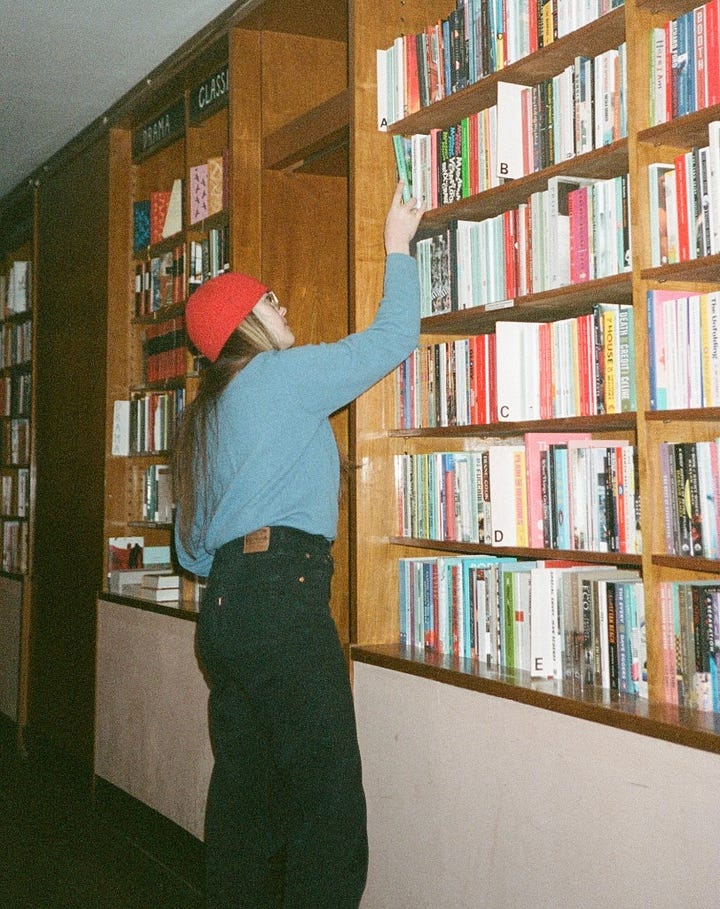
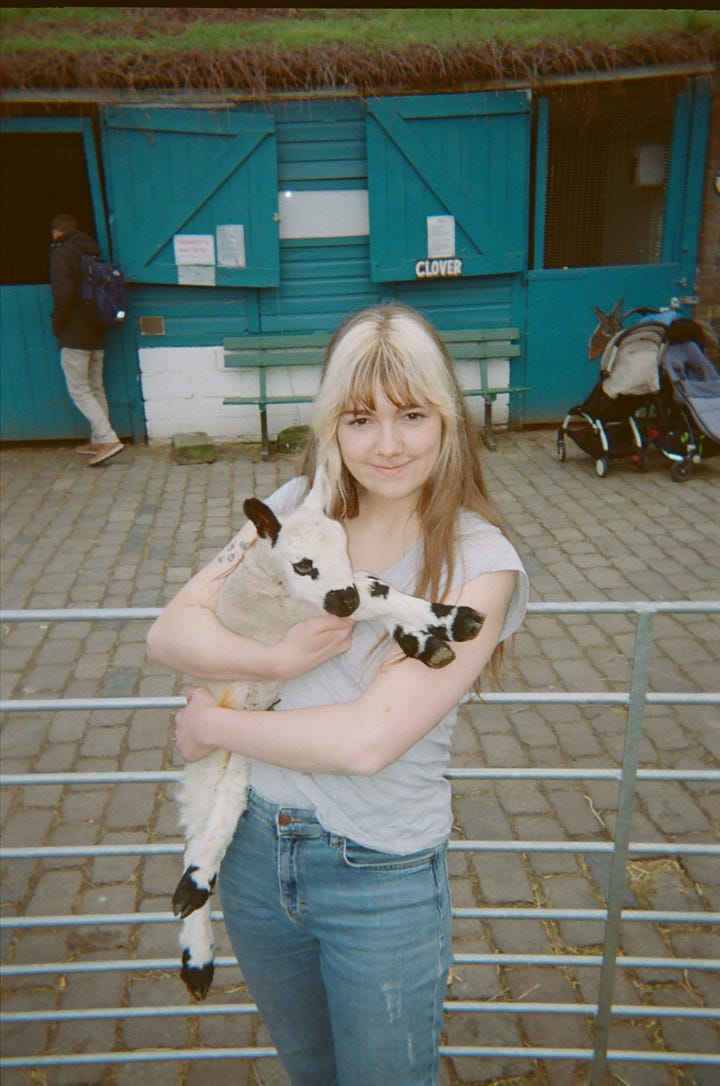
I have this recurring fantasy where I get to start over on the internet. In the fantasy, I create a whole new account with no history, no followers, and no connection to any of my past work. The first post I share is seen by no one. My account feels like a diary because no one is reading it. When I do gradually gain a following, it’s in response to my true self. I post frequently, candidly, without first imagining how it might be received. There is no editing, no concealment. I tell the internet everything. Everything. I am beloved by a small handful of like-minded people. This is more than enough.
The vast majority of my following arrived in 2018, the year I posted a series of animal drawings executed in obsessive, microscopic detail. The drawings were the size of a fingertip. As you might imagine, the internet ate it up.
2018 was also the year I started wearing glasses and doing physical therapy for my neck.
My big break was when a famous account shared my work. I received 20,000 follows overnight. I kept refreshing my phone, watching the number rise. I couldn’t conceptualize the scale of my new audience. In fact, I still can’t. My following is larger than the population of my home city (New Haven, CT). I did not evolve to interact with over 100,000 people at one time; I have a difficult enough time in group conversations.
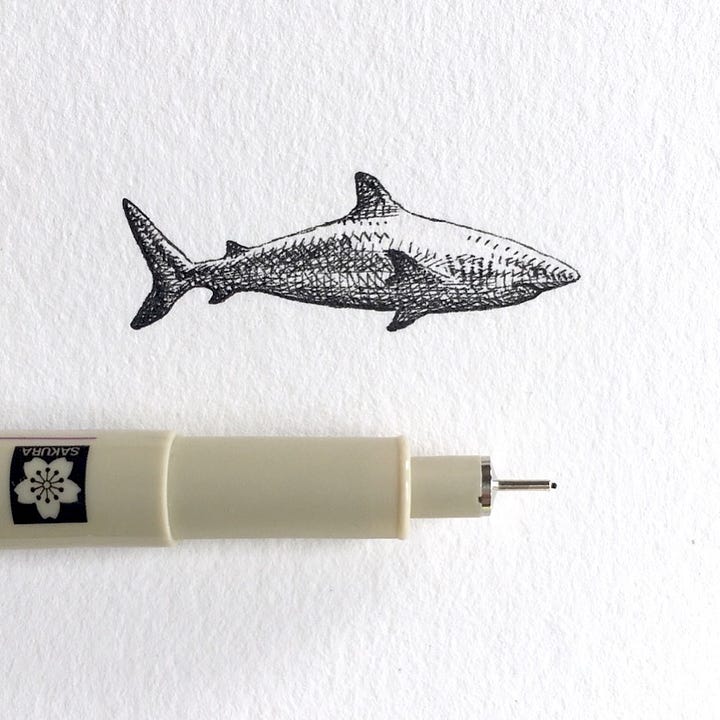
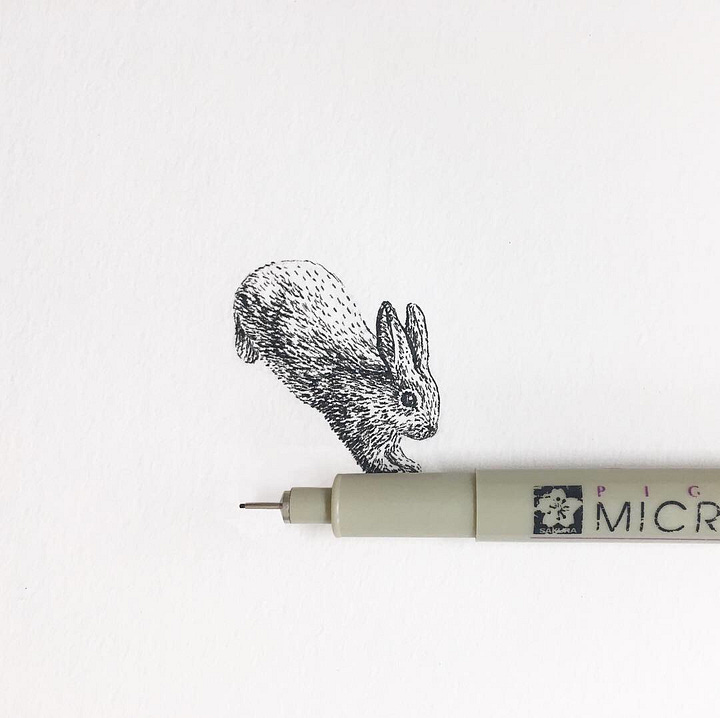
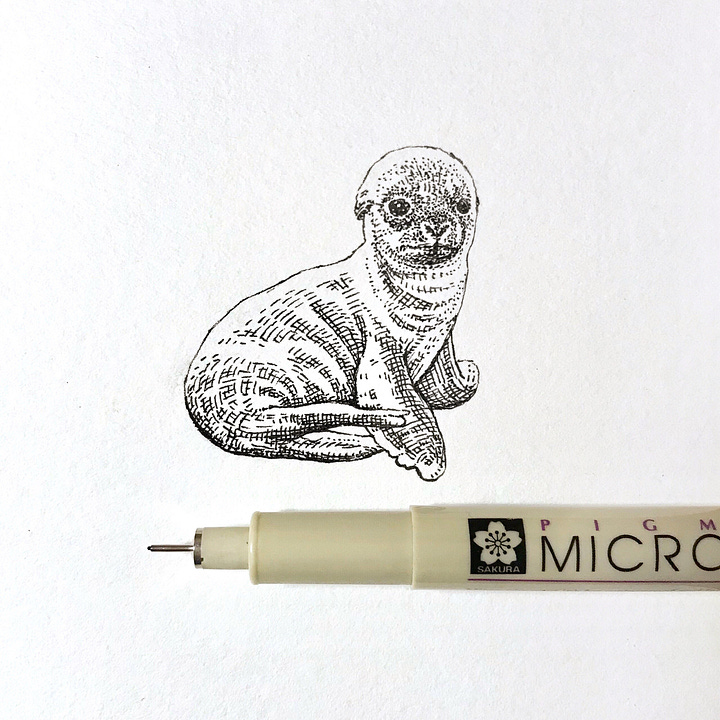
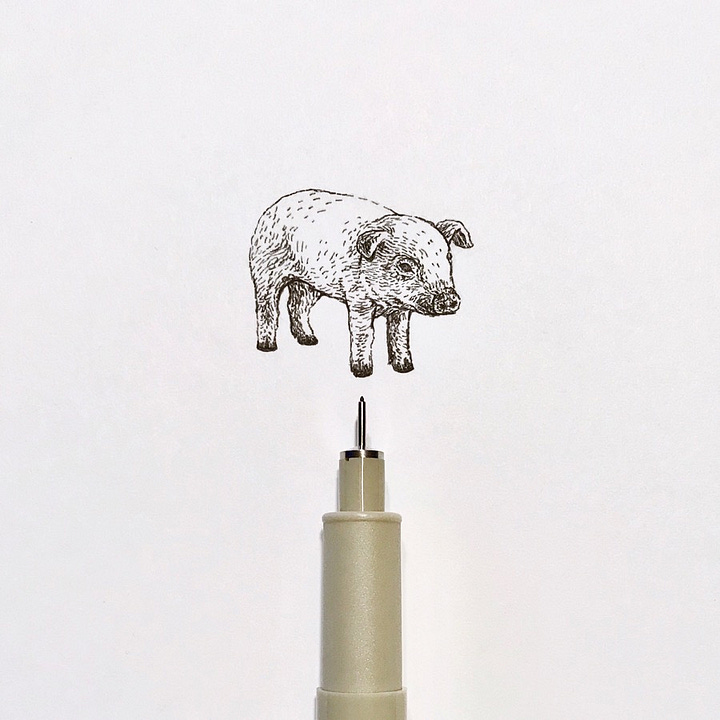
At first, I tried to ignore this new exposure, treating the internet like a private chat with my closest friends. I live-blogged panic attacks and medical crises. There’s a photo of me hyperventilating in a towel on a twin mattress that was viewed by 30,000 people. Even today, years after I’ve stopped sharing such moments, I still encounter strangers who remember them. They remember the time I had a mental breakdown on the floor of my Paris flat, the time I walked around Brooklyn and filmed myself complaining about how I hadn’t gotten laid recently, or the time I absolutely roasted a very recent ex (an extraordinarily decent guy) for going on a date with someone new—never mind the fact that I had initiated the breakup. Nowadays when I meet these people, I wonder if they might remember my life more clearly than I do. They experienced it all at a distance, in a series of rectangular slices, stripped of all context, complexity, aftermath. I had to actually feel everything. I had to deal with it.
This compulsive sharing was great for the numbers. My account became a one-woman gossip rag. I was great entertainment. I got messages all the time saying, Your art is nice and all but really I’m here because of your vulnerability. Wait, what? I was quickly becoming more personality than artist. But what if I wanted to be an artist? What if I wanted my art to be taken seriously? Was I planning to draw baby animals and cry into a camera for the rest of my life? Fuck no. If my work was going to succeed, I wanted it to succeed on its own merit, not just because it was accompanied by a caption detailing how bad my mental health has been lately. What I really wanted was to start over.
Some would say I took drastic measures. I legally changed my first and last name. I moved to a different country. I switched from drawing to painting. I got into writing. I lost 10,000 followers. I tried not to get fussed about it—a fixation on numbers seemed petty, especially given how large of an audience I still had—and yet I couldn’t help but think of those 10,000 defectors as a sort of militia, each unfollow a suggestion that I cease to exist.
Still, I needed money. I needed to sell. So despite my fresh start, I slipped back into old ways, posting crowd-pleasing art and deleting unsuccessful posts, being vulnerable for likes and attention. Look, I am a full-time freelancer. I rely on your goodwill for survival. The fact is, you’ve got no shortage of artists to choose from. There are too many of us and not enough of you. We’re all out here fighting to be that one artist you support, fighting to cover another month of food and healthcare and London/NYC rent, fighting to beat the odds and actually make it. So if the road to making it happens to be paved with mass-appeal, then fuck it, I guess I’ll get down on my hands and knees and lay down some pretty little cobblestones.
Working in public does weird things to your creative process. Good art requires a unique viewpoint, which is tough to inhabit when you’re also trying to inhabit the viewpoints of your followers: your friends, your extended family, everyone you went to high school with, everyone you’ve dated, everyone you might someday date, everyone who’s ever commissioned or collected your work, and everyone who holds the keys to the galleries and prizes and other institutions you revere. To a certain extent, social media subjects us all to this potential viewership. But when you have a large following, the potential becomes real and unignorable. Imagine sharing a nude drawing or a blog post about your love life, only to learn via the likes and comments that your post has been seen by your middle school chemistry teacher, your nephew, your favorite singer, and that one girl who broke your heart a few years ago and never gave you your shit back. You can’t just tune out that audience the next time you sit down to draw or write. That audience is now part of your process. In an attempt to please everyone, your art becomes boring, quiet, watered down, bearing no connection to the genuine and potentially divisive creative voice you are now fighting to suppress.
What we think of as vulnerability is inoffensive and apolitical, its scope limited to the closed chamber of the self, to the feelings and anecdotes and relationships and other essential human dramas we all experience. In this framework, people from diverse ideological backgrounds can relate to each other frictionlessly. For example, a conservative might relate to a liberal because both are dating shitty guys who don’t text back; a vegan influencer might relate to a cattle rancher because both listen to cheesy pop music; a humanitarian aid worker might relate to a genocidal oligarch because both have eczema. In a sense, this is a beautiful thing: vulnerability cuts across social strata to unite us all as human beings. But it’s also very safe. If I want to seem courageous to you, without actually risking anything, I just have to make you believe that what I am sharing is difficult to share. A successful display of vulnerability is one that leaves you thinking, “Most people will judge her for this but I won’t.”
Real courage is absent from most displays of vulnerability. Take the following examples, all of which are true: “I don’t shower enough,” “I had an eating disorder,” “I was in an abusive relationship.” These may seem risky admissions at first glance, but ultimately they refer only to myself; they have no bearing on the wider world. They say nothing you could disagree with (unless you’re broadly anti-disclosure). Real courage entails trespassing beyond the safe enclosure of the personal to establish a position, take a stand, present oneself not just as human generally but as one particular human. When I fantasize about starting over, what I really want is to step down from the pedestal of the vague and become particular in your eyes.
But how to get comfortable with the fact that my particularities might annoy or offend or bore those who have supported me, emotionally and/or financially, for years? Well, that’s just life, isn’t it? The more I complete your picture of me, the more it will conflict with the picture you’ve constructed. This is fine, I keep telling myself. Not everyone needs to like me. Besides, my following is probably bigger than it ought to be. Maybe I’m like a rich person who became rich through tax evasion: now the time has come to pay my taxes. And even if I do lose a sizable portion of my following, I’ll still have a few people who get it. Better to have a few people who get it than 100,000 who don’t. Right? (My agents / publishers / banks might disagree.)
Without further ado, here are some aspects of myself I haven’t shared online because I’m too afraid of alienating my audience:
I’m extremely techno-skeptical, verging on Neo-Luddite. I don’t own a smartphone. I used to own one and, like most smartphone owners, I was fully addicted, looking at it for up to five hours a day—a figure I have since heard described as “moderate.” I hate what technology is doing to our culture. I’m as anti-AI as you can get. And while I may have built a career on social media, that experience has only made me more aware of its negative impacts. I want to facilitate conversations about how we move forward as a society that has unquestioningly adopted all new technology, to the detriment of our well-being.
There is a lot of art, modern and historical, that I think is undeservedly revered despite being lazy or empty or ill-conceived. In other words: bad art. But people hate when I talk about bad art. For one artist to critique another comes across as narcissism (“My own work is better”) or gatekeeping (“I decide who gets to be an artist”). I honestly do take issue with the modern notion that everyone’s an artist, that taste and quality are subjective, that art is just this nice fun hobby I happen to earn money from despite not being objectively more qualified than your aunt who paints ugly watercolors of tropical sunsets in her retirement village. Of course art is subjective to a certain extent, but it is not entirely subjective. I want to express my tastes online without being pilloried as a self-aggrandizing snob. I want you to understand that my hatred of bad art stems from a quasi-religious reverence for good art.
That said, I probably care more about writing and literature than I do about visual art. Don’t get me wrong, I love painting—I could spend all day in a museum, I have a degree in art history and won’t shut up about Lucian Freud—but still, painting strikes me as a technical challenge and not a mode of psychological expression. Maybe my attitude will change as I improve, developing a means of sharing ideas in visual form. For now though, literature is my life. I see myself as a writer who paints, rather than the other way around.
I’m critical of certain mainstream liberal discourses surrounding relationships, gender, sexuality, psychology, etc. My social circle both online and in real life leans heavily queer-artsy-left, and in many ways that designation does suit me; yet I also harbor opinions I’m wary of expressing. To be frank, the backlash in these communities can be vicious and career-ruining, and thus far I haven’t felt like dealing with that.
Going forward, I want to share these sides of me and more. I’m not asking for anything from you as a reader. Feel free to do whatever you like, whether that’s sticking around or unfollowing or giving me a piece of your mind. Really, I’m sharing this to prepare you (and me) for a shift in what I share online. This shift is intentional, and there will be growing pains. I hope you’ll feel free to share with me any response you have, be it supportive or critical. Overall, I’m excited to begin, and I feel a huge sense of relief just typing this out.
On a practical level, here’s what’s changing: I’ve set up a paid newsletter where I’ll share more regular updates and any especially private / controversial / half-formed thoughts. I’ll still send out the occasional free update here, so if you’re unable to contribute then you can just sit tight and keep getting these.
(Other ways to show support include: joining my Patreon for art updates, following me on Twitter, and ordering my instructional book.)
Thanks for your attention and understanding. I’m really looking forward to this new chapter of freer expression. My hope for you is that you can also find or create your own environment—whether that’s an online community, a diary, or a relationship—where you can be honest about who you are.
All my love from London,
August
P.S. I’m planning to be in NYC for the month of May. Any art / lit / music things I should go to (or get involved in) while I’m there?
P.P.S. In case you missed it, I’m publishing a novel! More on this soon…


I love this post and I wholeheartedly agree with every one of your bullet points. I feel the same way about each of them. (I'm too lazy to reiterate them here but hopefully the fact that I've said more than "same" is enough -- I guess I'm attention-seeking now.)
The point is, you are not alone, and I wish you incredible success in this new chapter defined by a new PR strategy. I think people will appreciate that you care about being not just "vulnerable" but genuine. For me, some would call it "honest to a fault." Well, I picked my poison and it's honestly. Also, you might like to know I subscribed to your paid Substack unhesitatingly. No pressure lol! I actually like your writing even more than your art because it resonates with me so well. (And I do find your art impressive.) Keep truckin on~
In a way, what you're portraying is not a criticism of vulnerability per se -- because I'd argue this post is far more vulnerable than these "vulnerable" social media posts -- but rather you're critical of the particular ways of sharing about oneself that fall within our social norms and expectations. This faux vulnerability where you can talk about your sexual conquests and disappointments, for example, with a tone of acting outside of social norms, when in reality these sorts of displayed confessions are the expectation and not even remotely subversive. Sex and The City may've been slightly controversial in its time, but now if anything, it's basically the manifesto dictating what the life of the contemporary young urban person should peacock into their digital persona. The underlying ideology within this display, that when confessing our failures in satisfying some ultimate hedonic desire we are at the height of our vulnerability, is to say that we are fundamentally entitled, self-interested, and happiness-obsessed individuals who could care less for fixing an exploitative system which we sit atop of. It's a bit of artificial coloring that only serves to re-emphasize the grayness of our social reality; a reality absent of the desire for self-transcendence and communal values. To the most ardent believers of this ideology, the only thing that could possibly be missing in this world is tolerance. Tolerance, which in being this blind acceptance of anything and all things, is a tsunami which engulfs the city and leaves it sitting in a muck of ubiquitous okayness. Nothing can rise above this. Nothing can be condemned within this. Stop having values, taste, subjectivity. Accept the middling greige reality.
Anyways, thanks for the post. Your art is cool. I'll still vaguely follow you despite needing to confront the irony of one near Neo-Luddite digitally following another near Neo-Luddite.